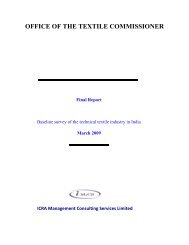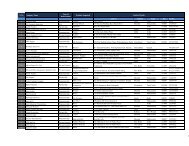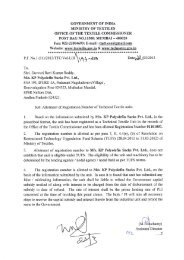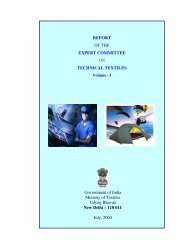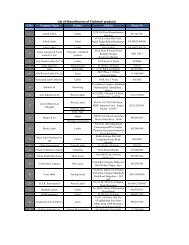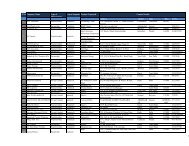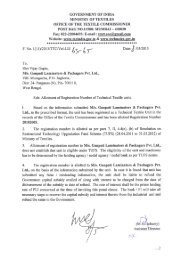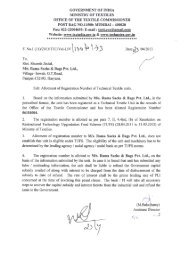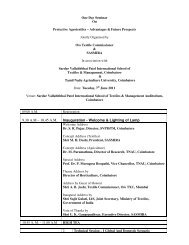- Page 1 and 2:
Domestic technical textiles Industr
- Page 3 and 4:
Domestic consumotion of Oekotech is
- Page 5 and 6:
Overall, the domestic consumption o
- Page 7 and 8:
1. Low awareness about the benefits
- Page 9 and 10:
The key application areas of shade
- Page 11 and 12:
Shade-nets usage in India Existing
- Page 13 and 14:
Imports and Exports of Shade-nets T
- Page 15 and 16:
At present, mulch mats are being us
- Page 17 and 18:
during the Xth plan. The mulching t
- Page 19 and 20:
The machinery required is available
- Page 21 and 22:
a low level of shade (13% to 30%).
- Page 23 and 24:
The quantum of imports for Anti-hai
- Page 25 and 26:
In addition, woven crop-covers are
- Page 27 and 28:
Fishing nets Fishnets are key techn
- Page 29 and 30:
There are as many as 250-300 player
- Page 32 and 33:
MEDITECH Meditech products include
- Page 34 and 35:
Surgical Dressings Contact Lenses A
- Page 36 and 37:
Company Name Capital Employed (Rs c
- Page 38 and 39:
The baby diaper market in India is
- Page 40 and 41:
Incontinence Diapers Incontinence d
- Page 42 and 43:
The import figures for adult incont
- Page 44 and 45:
cover close to 85-90% of sanitary n
- Page 46 and 47:
In India, the majority of hospitals
- Page 48 and 49:
Average price per drape Rs 300 Aver
- Page 50 and 51:
In addition to the imports listed a
- Page 52 and 53:
administrators to promote the usage
- Page 54 and 55:
Exports of surgical sutures are exp
- Page 56 and 57:
Non-adherent hypoallergenic, gamma
- Page 58 and 59:
Rolled bandage Crepe bandage POP ba
- Page 60 and 61:
Contact Lenses The contact lenses a
- Page 62 and 63:
Eyewear market (per annum) Around 3
- Page 64 and 65:
There are two types of artificial h
- Page 66 and 67:
The imports of heart valves arrive
- Page 68 and 69:
Key manufacturers TTK Healthcare in
- Page 70 and 71:
TTK Healthcare in collaboration wit
- Page 72 and 73:
Artificial kidneys Domestic usage A
- Page 74 and 75:
HS Code Description 90189099, 90211
- Page 76 and 77:
Artificial Cornea The cornea is the
- Page 78 and 79:
Artificial Heart In India, about 20
- Page 80 and 81:
MOBILTECH Mobiltech segment of tech
- Page 82 and 83:
Nylon tyre cord Seat belt webbing*
- Page 84 and 85:
Market size (ECTT report) Airbags (
- Page 86 and 87:
(Vehicles in '000 numbers) Producti
- Page 88 and 89:
Seat belts webbings Effective domes
- Page 90 and 91:
The exports of seat belt webbing fr
- Page 92 and 93:
Car upholstery: Seat cover fabrics
- Page 94 and 95:
HS Code Description Imports Imports
- Page 96 and 97:
Quantity 1.04 lakh nos. 2.1 lakh no
- Page 98 and 99:
Quantity 13.6 million sq. m. 29 mil
- Page 100 and 101:
Headliner fabrics domestic usage Qu
- Page 102 and 103:
Insulation Felts Insulation felts,
- Page 104 and 105:
The manufacturing process for NVH p
- Page 106 and 107:
The potential market for sunvisors
- Page 108 and 109:
Autoliv is global leader in airbag
- Page 110 and 111:
Helmets Helmets are used as protect
- Page 112 and 113:
Helmets market - Domestic usage Qua
- Page 114 and 115:
Nylon tyre cord fabric Nylon tyre c
- Page 116 and 117:
The production of nylon tyre fabric
- Page 118 and 119:
Usage of technical textiles in airl
- Page 120 and 121:
The current and future forecast of
- Page 122 and 123:
UK accounts for over 50% of the imp
- Page 124 and 125:
The typical usage 9 of the material
- Page 126 and 127:
PACKTECH Packtech includes several
- Page 128 and 129:
Market size (ECTT report) Polyolefi
- Page 130 and 131:
• Tarpaulins • Leno bags • La
- Page 132 and 133:
Neo Corp Intern 2006-07 2007-08 7,6
- Page 134 and 135:
Polyolefin Woven Sacks (excluding F
- Page 136 and 137:
Value Rs 6,725 crore Rs 12,950 cror
- Page 138 and 139:
Flexible Intermediate Bulk Containe
- Page 140 and 141:
prices in the last few years have s
- Page 142 and 143:
Leno Bags Leno bags are excellent f
- Page 144 and 145:
The main machine required for leno
- Page 146 and 147:
Soft Luggage The luggage industry i
- Page 148 and 149:
HS Code* Description 42021110/20/30
- Page 150 and 151:
Jute Hessian and Sacks (including F
- Page 152 and 153:
Manufacturer Year Quantity (MT) Val
- Page 154 and 155:
Source: IBIS, IMaCS Analysis * This
- Page 156 and 157:
• IS 11193:1984 Jute canvas posta
- Page 158 and 159:
The market size of tea-bag filter h
- Page 160 and 161:
SPORTECH Sportech segment comprises
- Page 162 and 163:
Swimwear Tents TOTAL Value Quantity
- Page 165 and 166:
Sports Composites Market Sports com
- Page 167 and 168:
and Germany. The Boxing equipments
- Page 169 and 170:
Artificial turf Artificial turf, or
- Page 171 and 172:
Hence, on an average, 6-8 astro-tur
- Page 173 and 174:
• Harness - The pack is fastened
- Page 175 and 176:
Equivalent parachute fabric Around
- Page 177 and 178:
The market for hot air balloons is
- Page 179 and 180:
88010020 Hot air balloon envelope Q
- Page 181 and 182:
Sail cloth Sail is a large piece of
- Page 183 and 184:
equally over the years which equals
- Page 185 and 186:
Sleeping bags Value Rs 12 crore app
- Page 187 and 188:
• Bundesman water Repellency Equi
- Page 189 and 190:
The specifications for various nets
- Page 191 and 192:
Sport shoes components Product char
- Page 193 and 194:
The Indian shoe manufacturing indus
- Page 196 and 197:
Tents Tents are portable shelter ma
- Page 198 and 199:
The domestic market for camping ten
- Page 200 and 201:
Cotton and Polyester cotton blended
- Page 202 and 203:
Besides the outer part of tent, fab
- Page 204 and 205:
Swimwear A swimsuit, bathing suit o
- Page 206 and 207:
esistance. While this chlorine resi
- Page 208 and 209:
61123100, 61123990, 61124100, 61124
- Page 210 and 211:
Summary of the market-sizing for Bu
- Page 212 and 213:
The key impediments to growth of Bu
- Page 214 and 215:
• PVC coated polyester PVC coated
- Page 216 and 217:
Market size of tensile membrane fab
- Page 218 and 219:
Quality Control and Standards The p
- Page 220 and 221:
Hoardings are facing resistance bec
- Page 222 and 223:
fabric Quantity 95 million sq m or
- Page 224 and 225:
Tarpaulins - HDPE, Cotton canvas an
- Page 226 and 227:
enjoys over the HDPE tarpaulin is t
- Page 228 and 229:
HS Code Description 63061990 630619
- Page 230 and 231:
The average domestic market price o
- Page 232 and 233:
• Kabra Extrusiontechnik Ltd. (KE
- Page 234 and 235:
size of awnings & canopies has been
- Page 236 and 237:
• Woven or Warp knitted fabrics -
- Page 238 and 239:
Floor and wall coverings Floor & Wa
- Page 240 and 241:
The estimated import figures for Fl
- Page 242 and 243:
Scaffolding Nets Scaffolding nettin
- Page 244 and 245:
CLOTHTECH The Clothtech segment of
- Page 246 and 247:
Umbrella Cloth Sewing Threads TOTAL
- Page 248 and 249:
Impediments to growth The cheaper i
- Page 250 and 251:
countries next only to China. The I
- Page 252 and 253:
of 300 denier. Reliance Industries
- Page 254 and 255:
The current domestic men’s readym
- Page 256 and 257:
Imports and Exports of Interlining
- Page 258 and 259:
Zip Fasteners A zipper (zip fastene
- Page 260 and 261:
segment is expected to grow at 4% y
- Page 262 and 263:
Source: IBIS, IMaCS Analysis Over 5
- Page 264 and 265:
Current Market size and future pote
- Page 266 and 267:
The key machinery suppliers in Indi
- Page 268 and 269:
segment consumes H&L fasteners in c
- Page 270 and 271:
HS Code* Description 58061000, 5806
- Page 272 and 273:
Labels Label is a piece of material
- Page 274 and 275:
Average price of a label Rs 0.55 Av
- Page 276 and 277:
Printed labels are often printed on
- Page 278 and 279:
Umbrella Fabric Umbrella fabric is
- Page 280 and 281:
Sewing threads Sewing thread is a p
- Page 282 and 283:
Madura Coats Ltd (MCL), a subsidiar
- Page 284 and 285:
HS Code Description Imports (in Rs
- Page 286 and 287:
The stuffed toys segment is expecte
- Page 288 and 289:
Market size (ECTT report) Jute carp
- Page 290 and 291:
Fiberfil Fiberfil refers to Polyest
- Page 292 and 293:
Value Chain of Virgin PSF Petrochem
- Page 295 and 296:
Carpet Backing Cloth A carpet is an
- Page 297 and 298:
Jute CBC Synthetic CBC Total Key ma
- Page 299 and 300:
Stuffed toys Stuffed toys, also ref
- Page 301 and 302:
HS Code Description Quantity 950300
- Page 303 and 304:
Slat blinds, which consist of many
- Page 305 and 306:
63039910/90, 63049990, 63061930 391
- Page 307 and 308:
Filtration efficiency: Filtration e
- Page 309 and 310:
sizes and use different filtration
- Page 311 and 312:
Type of Raw materials The major fil
- Page 313 and 314:
The import of filter fabric used in
- Page 315 and 316:
Pillows can be made of variety of f
- Page 317 and 318:
Imports and Exports The import figu
- Page 319 and 320:
of 15%). The market potential for w
- Page 321 and 322:
Nylon net consumption norm (Mosquit
- Page 323 and 324:
PROTECH Protech is an ensemble of t
- Page 325 and 326:
apparels and high visibility clothi
- Page 327:
Market size (ECTT report) (C) F. R.
- Page 330 and 331:
With the rising trend of crime, vio
- Page 332 and 333:
fire. The there are typically two m
- Page 334 and 335:
In addition, Delkon Textile Pvt. Lt
- Page 336 and 337:
Fire /Flame retardant apparel The f
- Page 338 and 339:
manufactured using inherently fire
- Page 340 and 341:
Nuclear Biological and Chemical (NB
- Page 342 and 343:
High-Visibility clothing High visib
- Page 344 and 345:
Quantity (Lakh pieces) 60.0 120.7 V
- Page 346 and 347:
chemical and chemical product indus
- Page 348 and 349:
High altitude clothing High altitud
- Page 350 and 351:
Domestic use of high altitude cloth
- Page 352 and 353:
The market of work gloves or indust
- Page 354 and 355:
40159030 Industrial gloves 4.95 6.3
- Page 356 and 357:
GEOTECH Geotech segment comprises o
- Page 358 and 359:
The principal functions performed b
- Page 360 and 361:
one or two directions for improved
- Page 362 and 363:
Roads (excluding PMGSY) 245,000 54,
- Page 364 and 365:
Kusumgar Corporates 2007-08 250 225
- Page 366 and 367:
Sectors Investment Needs during 200
- Page 368 and 369:
above factors in mind, we have assu
- Page 370 and 371:
At present, majority of manufacture
- Page 372 and 373:
OEKOTECH Oekotech segment refers to
- Page 374 and 375:
Both woven and non-woven geosynthet
- Page 376 and 377:
Total 72.40 6827.25 Source: Industr
- Page 378 and 379: • AGM glass battery separators
- Page 380 and 381: Paper making fabrics TOTAL Value Qu
- Page 382 and 383: Indutech segment of technical texti
- Page 384 and 385: Bombay Dyeing is the largest manufa
- Page 386 and 387: Bolting Cloth Bolting cloth is a me
- Page 388 and 389: Absorbent Glass mat Battery separat
- Page 390 and 391: End-user Year Quantity Value (Rs Un
- Page 392 and 393: 70193900, 70199010, GLASS FIBRE SHE
- Page 394 and 395: (Million) rods) (Crore) ITC 2007-08
- Page 396 and 397: Coated abrasives An abrasive materi
- Page 398 and 399: Cloth backing consumption norms (co
- Page 400 and 401: Conveyor Belts Belt Conveyor system
- Page 402 and 403: Market size 2007-2008 2012-2013 Uni
- Page 404 and 405: The transmission belts can be class
- Page 406 and 407: HS Code Description Imports (in Rs
- Page 408 and 409: Quality Control and Standards Raw M
- Page 410 and 411: 5. Inkwayz - Super Tech Ribbon Pvt.
- Page 412 and 413: Printed Circuit Board The Printed C
- Page 414 and 415: The potential market for glass fibr
- Page 416 and 417: Source: DGCIS, IMaCS Analysis The c
- Page 418 and 419: The demand for these fabrics is pri
- Page 420 and 421: Paper Making Fabric industry 2007-0
- Page 422 and 423: Composites The burgeoning manufactu
- Page 424 and 425: Building and Construction Construct
- Page 426 and 427: The current and future forecast of
- Page 430 and 431: Market dynamics and key growth driv
- Page 432 and 433: 56074900 56079090 56081900 56089090
- Page 434 and 435: Filtration products Key application
- Page 436 and 437: Polymer Paper Limited is another fi
- Page 438 and 439: 59119090, 59111000, 59112000, 59113
- Page 440: BIS Standard Description IS 11574 :






